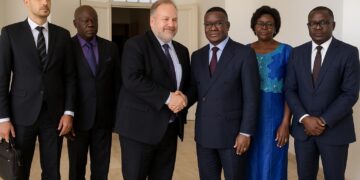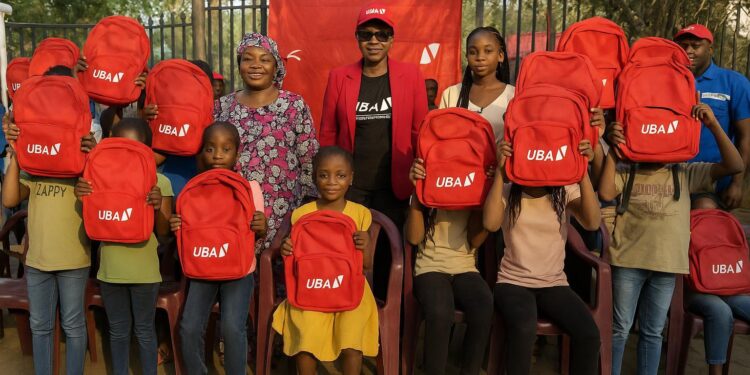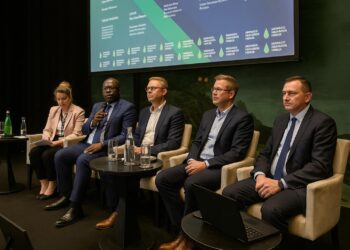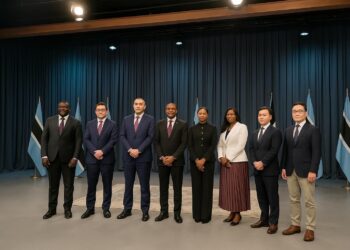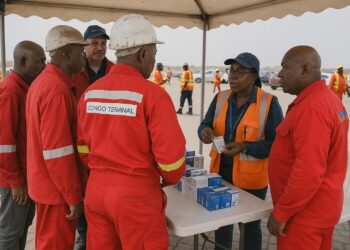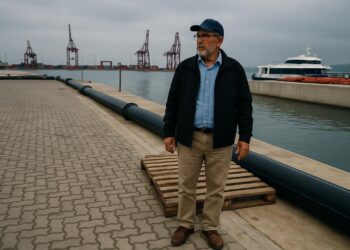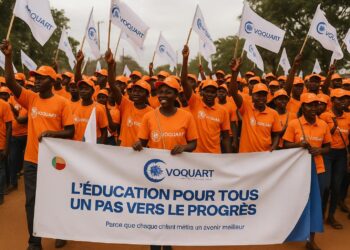UBA donation strengthens social capital in Congo
On 17 October, United Bank for Africa Foundation handed complete school kits to 50 children from ten Brazzaville orphanages, answering a call by the Congolese Orphanage Network. The event took place inside UBA’s modern Bacongo branch, turning a banking hall into a classroom of hope.
Branded backpacks, textbooks, notebooks, blankets, pencil cases, pens and calendars were stacked like trading books on a desk. Each item, modest in price yet rich in symbolism, signals a commitment to equip vulnerable youth with the same tools enjoyed by their peers across the city.
“Education gives compound interest to society,” declared Yago Touré, UBA Congo’s incoming Managing Director, flanked by her executive committee. She thanked the orphanage network for “raising future doctors, engineers and entrepreneurs who will power Congo’s diversification agenda”. Her remarks drew applause from local officials in attendance.
ROC coordinator Sister Angéline Nkouka welcomed the support. She reminded guests that most orphanages rely on irregular private gifts to buy textbooks. “With a structured partner we can plan lessons, not emergencies,” she said, pointing to the new kits carefully labeled with each child’s name.
Read Africa connects books and banking
UBA Foundation’s flagship initiative, Read Africa, has distributed more than 3,500 novels and biographies in Congo since 2011, according to internal data. By placing African authors in young hands, the programme seeks to upgrade literacy rates that still hover near 80 percent nationally.
The latest donation included Chimamanda Ngozi Adichie’s “Purple Hibiscus”, selected to stimulate discussion on leadership, resilience and family bonds. Bank volunteers promised quarterly reading circles with the orphanages, embedding mentorship beyond one-off gifts. Analysts view that continuity as the hallmark of credible corporate social investment.
Corporate giving supports national development plan
Brazzaville’s National Development Plan 2022-2026 calls for stronger private-sector participation in social services, especially basic education. By stepping up, UBA complements government spending already targeted at renovating primary classrooms and digitising curricula, goals championed by President Denis Sassou Nguesso in several recent budget speeches.
Public-private coordination is facilitated by the Ministry of Social Affairs, which vets orphanages and grants duty-free clearance on imported didactic material. Observers note that such administrative support reduces transaction costs for donors and quickens the flow of goods to beneficiaries.
Banks escalate ESG competition in Central Africa
Banks across Central Africa are sharpening their environmental, social and governance scorecards as regulators and investors pay closer attention. Ecobank and BGFI recently launched scholarship funds, while Societe Generale sponsors digital coding clubs. The Bacongo event positions UBA among the industry’s impact front-runners in Congo.
Credit analysts argue that visible CSR can translate into customer loyalty and lower reputational risk, ultimately compressing funding costs. A Fitch report on African banking margins cites social goodwill as an intangible yet growing differentiator in retail markets where products are increasingly commoditised.
Investors link transparency to impact returns
Foreign portfolio managers tracking the BRVM regional exchange monitor non-financial disclosures in their country screens. UBA’s parent group publishes a sustainability report audited by Ernst & Young, enhancing transparency for institutions seeking both yield and impact. The Brazzaville initiative will feature in the 2025 edition, management confirmed.
Diaspora investors are also attentive. Congolese professionals in Paris and Montréal pooled remittances worth an estimated CFA 15 billion last year, according to the World Bank. Interviews suggest they favour banks demonstrating community engagement, a factor that could steer deposits toward UBA’s rapidly expanding digital channels.
Educational needs underline scale of challenge
Yet the scale of need remains large. ROC counts roughly 1,400 orphans in Brazzaville alone, while UNICEF estimates 10,000 nationwide. Classrooms often lack electricity or internet access, and pandemic-era learning losses endure. Private donations, though welcome, must be sustained and coordinated to move literacy indicators.
Education economist Martial Mouanda believes banks can leverage their payment infrastructure to crowd-in individual givers. He proposes a zero-fee mobile wallet feature allowing account holders to round up transactions for school supplies. “Fintech can democratise philanthropy,” he told this publication, hinting at pilots under discussion.
Follow-up and broader economic implications
According to UBA officials, a follow-up assessment is scheduled for March. It will measure attendance, reading proficiency and kit durability. Findings will inform the size and design of the 2025 back-to-school campaign, ensuring evidence-based scaling rather than publicity-driven repetition.
For the fifty children leaving the branch with new backpacks, the immediate benefit was palpable. Smiles replaced early-morning apprehension, and chants of “Merci UBA” echoed down Avenue Matsoua. While modest in budgetary terms, such gestures weave trust between corporations, communities and the Congolese state.
As capital flows seek both profit and purpose across Africa, Brazzaville’s orphanages have become an unlikely barometer of corporate citizenship. The October ceremony suggests that when banks nurture readers today, they may also be underwriting a more skilled, inclusive and prosperous economy tomorrow.








